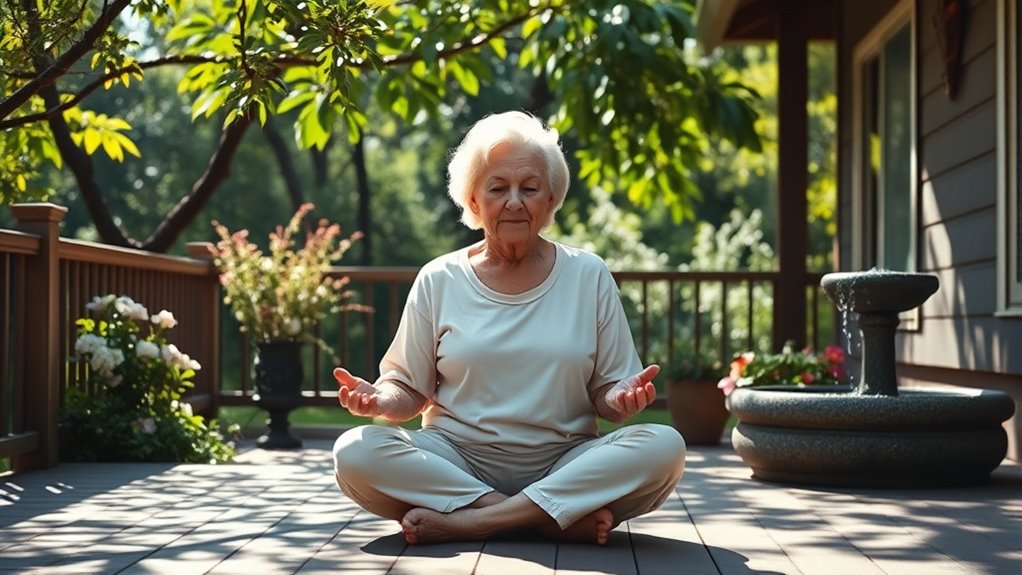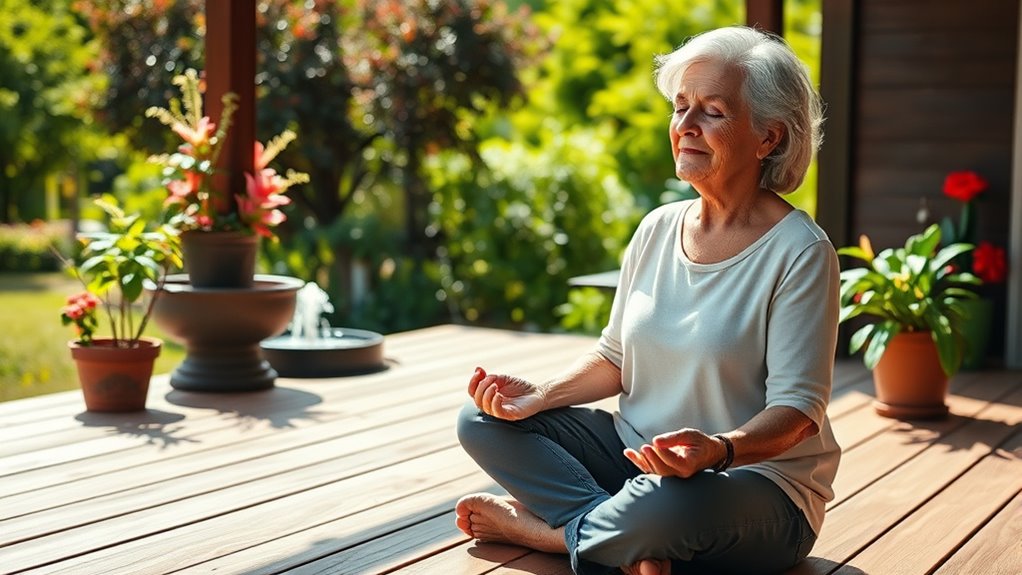By practicing mindfulness regularly, you can boost your memory, reduce stress, and build emotional resilience as you age. Techniques like deep breathing, body scans, and mindful walking help you stay present and calm. These practices strengthen your brain’s neural pathways, improve focus, and promote a sense of gratitude and acceptance. Incorporating simple exercises into your daily routine can make a meaningful difference—continue exploring how these techniques can support your well-being.
Key Takeaways
- Regular mindfulness practices like meditation and deep breathing improve mental clarity and emotional stability in seniors.
- Mindfulness enhances memory and cognitive functions by training focus and engagement with present experiences.
- Techniques such as body scans and mindful walking reduce stress hormones, promoting relaxation and overall well-being.
- Daily mindfulness routines help seniors accept bodily changes, fostering resilience and a positive outlook on aging.
- Incorporating short, consistent mindfulness exercises supports emotional health and empowers seniors to manage challenges effectively.

Have you ever wondered how mindfulness can enhance your quality of life as you age? It’s a powerful tool that can help you navigate the aging process with greater ease and joy. One of the key benefits of mindfulness is its ability to support memory enhancement. As you grow older, forgetfulness and memory lapses can become common concerns. Practicing mindfulness regularly trains your brain to stay present, which in turn helps improve your focus and recall. When you’re fully engaged in the moment—whether you’re listening to a loved one, savoring a meal, or taking a walk—your brain is more likely to retain those experiences. Over time, this focus can strengthen neural pathways associated with memory, making it easier to remember appointments, names, or where you placed your keys. Research‑anchored techniques have shown that mindfulness significantly boosts cognitive functions vital for memory.
In addition to memory benefits, mindfulness offers effective stress reduction techniques that are especially valuable as you age. Stress can take a toll on your physical and mental health, exacerbating issues like high blood pressure, sleep disturbances, and feelings of anxiety or depression. Mindfulness encourages you to observe your thoughts and feelings without judgment, creating a sense of calm and acceptance. Simple practices like deep breathing, body scans, or mindful meditation help lower cortisol levels, the hormone linked to stress. These techniques can be incorporated into your daily routine, whether you have just a few minutes or longer periods to dedicate to your practice. As you become more adept at recognizing stress triggers and responding with mindful awareness, you’ll likely notice a reduction in overall stress levels and an increased sense of peace.
Furthermore, mindfulness isn’t just about mental clarity; it also fosters emotional resilience. When you’re more present and aware, you can better manage the ups and downs that come with aging. You learn to accept changes in your body, cope with loss, and find gratitude for everyday moments. This emotional stability enhances your overall well-being and helps you maintain a positive outlook on life. By integrating mindfulness practices into your daily routine, you’re actively investing in your mental sharpness and emotional health, which are vital components of a fulfilling aging experience. Whether through meditation, mindful walking, or simple breathing exercises, these techniques empower you to take control of your mental state and enjoy a richer, more vibrant life as you age.
Frequently Asked Questions
Can Mindfulness Practices Help With Age-Related Cognitive Decline?
Yes, mindfulness practices can help with age-related cognitive decline. By focusing on the present moment, you can boost memory enhancement and improve your ability to concentrate. Additionally, mindfulness reduces stress, which is linked to cognitive aging. Regular practice helps you stay mentally sharp, supports emotional health, and may slow down cognitive decline over time. Incorporating mindfulness into your routine offers a simple, effective way to maintain cognitive robustness as you age.
Are There Any Risks or Contraindications for Seniors Practicing Mindfulness?
Imagine diving into meditation safety like exploring uncharted waters—you might worry about emotional risks or unintended effects. For seniors, mindfulness is generally safe, but it’s wise to stay alert for emotional risks like distress or anxiety. Always consult a healthcare professional before starting new practices, and if you experience discomfort, stop immediately. Mindfulness can be beneficial, but understanding potential risks helps make sure a safe, calming journey.
How Long Does It Typically Take to Notice Benefits From Mindfulness?
When you start practicing mindfulness, timing expectations vary, but many notice initial improvements within a few weeks. Consistency is key, and you might feel calmer, more focused, or less stressed early on. It’s important to be patient and give yourself time, as benefits often deepen over months. Stick with your routine, and you’ll likely experience ongoing positive changes that enhance your overall well-being.
Can Mindfulness Practices Be Adapted for Seniors With Physical Disabilities?
You can adapt mindfulness practices for seniors with physical disabilities by using accessible tools like seated meditation or guided imagery. Adaptive techniques, such as chair yoga or breath awareness exercises, make it easier to participate comfortably. These adjustments help guarantee seniors stay engaged and benefit from mindfulness, regardless of mobility limitations. With patience and personalized approaches, mindfulness can be inclusive, promoting well-being for all seniors.
What Are the Best Resources or Apps for Senior-Focused Mindfulness Training?
Thinking about the best resources or apps for senior-focused mindfulness training is like finding a cozy corner in a busy café. You’ll want apps that offer guided meditations and relaxation techniques tailored for seniors, such as Headspace, Calm, or Insight Timer. These platforms feature easy-to-follow sessions, adjustable lengths, and gentle guidance, making mindfulness accessible and enjoyable. They’re perfect for helping you relax, focus, and enhance your overall well-being.
Conclusion
By embracing mindfulness practices, you nurture your body, calm your mind, and enrich your spirit. You find peace in the present, strength in your awareness, and joy in each moment. You cultivate patience, foster gratitude, and build resilience. With each breath, each thought, each step, you take control of your well-being. Stay committed, stay mindful, and watch your life transform. Because your happiness begins with your mindfulness, and your mindfulness begins with you.









